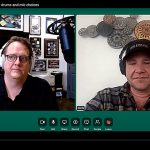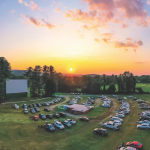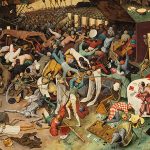Shortly after Dan Daley compiled and submitted the information for this column, the Nashville area was hit by what locals are calling a 100-year flood. Many of those who Dan interviewed for this column were directly or indirectly affected when water levels on the Cumberland River exceeded 50 feet – more than 12 feet above flood stage. For more details on the flooding and its aftermath, please CLICK HERE. -ed. It is said that in Nashville, one cannot swing a cat without said cat hitting at least one musician. However, said cat can screech all it wants, because that musician will already be capable of making all the noise he or she needs to.
There are more stacks and racks in the Nashville sound machine than in any other music center. This makes the city heaven for touring artists using it as a base, as do not only the vast majority of country artists but an increasing number of bands from elsewhere drawn to its well-stocked touring technology shelves and its central location, within a day's drive of about 70 percent of U.S. population centers. On the other hand, though, it can make for a highly competitive business climate for those selling sound.
"There is definitely some downward pressure on pricing, and everyone has to run a tighter ship," says Phil Scobee, general manager of Morris Leasing, which has had systems out with Kenny Chesney, Gretchen Wilson, Alabama and Sugarland.
But Nashville is a unique market; it's not a matter of packing three semis with gear and saying goodbye to them for the next four months. "This is a Thursday-to-Sunday touring model for a lot of acts," says Ken Porter, owner of Spectrum Sound. "The buses go out on Wednesday nights and they can be in Orlando in 12 hours. You can be in Denver, Dallas, Kansas City, Oklahoma City and be back on Monday."
That makes for an interesting inventory proposition: Most of your rental equipment is going to be out for four days a week, and since casinos and other venues that have their own PA in place figure so prominently in country touring itineraries, many tours go out with FOH and monitor consoles, maybe some front and side fills, but not entire PA systems. "Especially during the summertime, very few of the acts are carrying full production, because the fairs and the festivals or the promoters are providing the PAs," says Porter.
Two Tiers
The two biggest players in the Nashville market are Clair Brothers and Sound Image, but their Nashville offices are outposts in a larger network. "We rarely interact with most of the Nashville [infrastructure]," says Ralph Mastrangelo, senior director of touring for Clair. Although it remains a bastion for country music, Nashville's location often makes more logistical sense to base non-country music tours out of there – 3 Doors Down, Bad Company and Alice In Chains all originate out of Music City – and the personal relationships that are key in the business can often supersede geography. "It's that combination of logistics and relationships that really drives things," he says. (Clair outfits some major country music tours, including Keith Urban, Faith Hill and Martina McBride – the latter being, in part, the legacy of Clair's 1997 acquisition of MD Systems, which had been owned by McBride's husband John and operating out of Nashville since 1990.)
Differentiating one's company in a crowded and complex market like this is critical. Many, if not most, sound companies have implemented systems installation divisions. Others cater to the touring aspect of the Christian music industry, an active if not exactly affluent market based almost exclusively around Nashville and its southern suburbs Franklin and Cool Springs. Some combine both, such as the systems installation work that CTS Audio does for churches, which increasingly are becoming music and performance venues themselves, and the two VerTec systems it has on the road with groups such as Women of Faith, which are doing arena-sized venues this summer in a dual-tour format.
"There are so many sound companies in Nashville now, and unfortunately a lot of people are using the economy to play one off the other and cut prices," says Mike Taylor, director of performance audio for CTS Audio. While CTS also has roots in corporate live shows, that segment has not traditionally been a huge business in the Nashville area. [The flooding-related closure of the Gaylord Opryland Resort & Convention Center has already had a profound short-term negative impact on this market segment, but in the long term, the reopening of this facility, along with the 350,000 square feet of new exhibition space expected to open with the forthcoming Nashville Music City Center complex in 2013, could bode well for the corporate segment.]
Blackhawk Audio, another mid-sized SR provider in Nashville, also caters to the Christian and specialty touring market. It has one of its Meyer rigs out with the Celtic Woman Songs from the Heart tour this summer, and continues to develop the systems installation division it started about five years ago. Blackhawk Audio is also staying active in live sound for televised music events such as the Country Music Association (CMA) Awards, the Gospel Music Association (GMA) Dove Awards and the Stellar Awards shows. Blackhawk president Rick Shimer says he's tried to keep the company's revenue sources diverse, also adding its own trucking division and developing a specialty in ergonomics: configuring touring packages to take up the least amount of room possible on trucks and buses.
Mid-sized SR companies are watching certain trends warily. Some local FOH engineers have invested in high-end digital consoles and are renting them out as a package along with their services. In a market where a typical rental package might only include consoles, some fills and subs and microphones, that can represent a meaningful chunk of revenue. Shimer says that's collateral to the fact that live sound technology has also been impacted by digital's inevitable economics. "As the cost of live sound components comes down, it's inevitable that people are going to buy more of their own gear," he says. Ken Porter says the trend reminds him of what happened to recording studios when they were impacted by the same convergence of affordable digital technology and DIY-itis. "On the other hand, where people were eventually able to build their own studios, they're not going to start buying large boxes and line arrays and racks of power amplifiers," he says. "There's a limit to what artists can do on their own [for live concert touring] and, combined with the fact that live performance keeps getting more important to the music industry, there's still a good business for all of us here."



